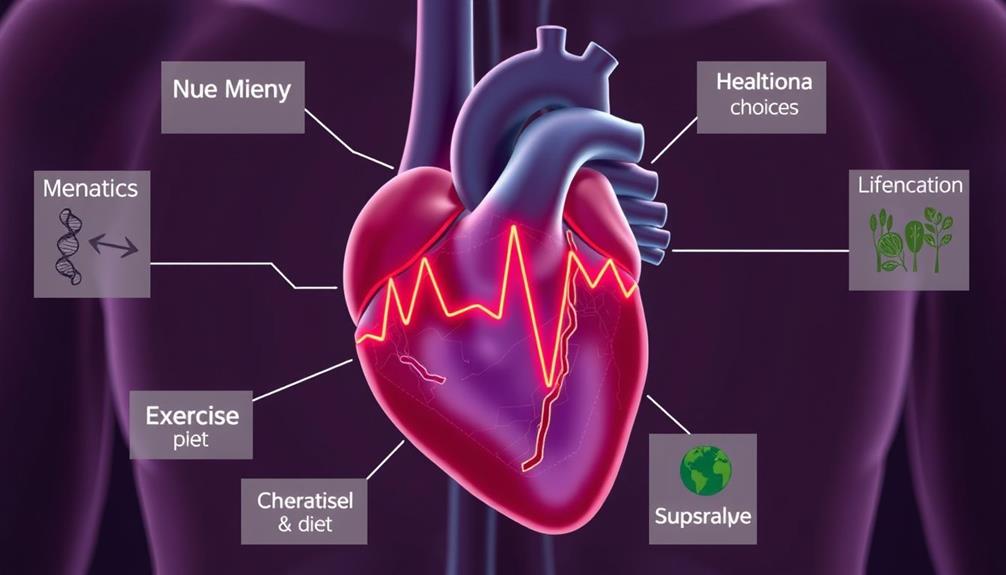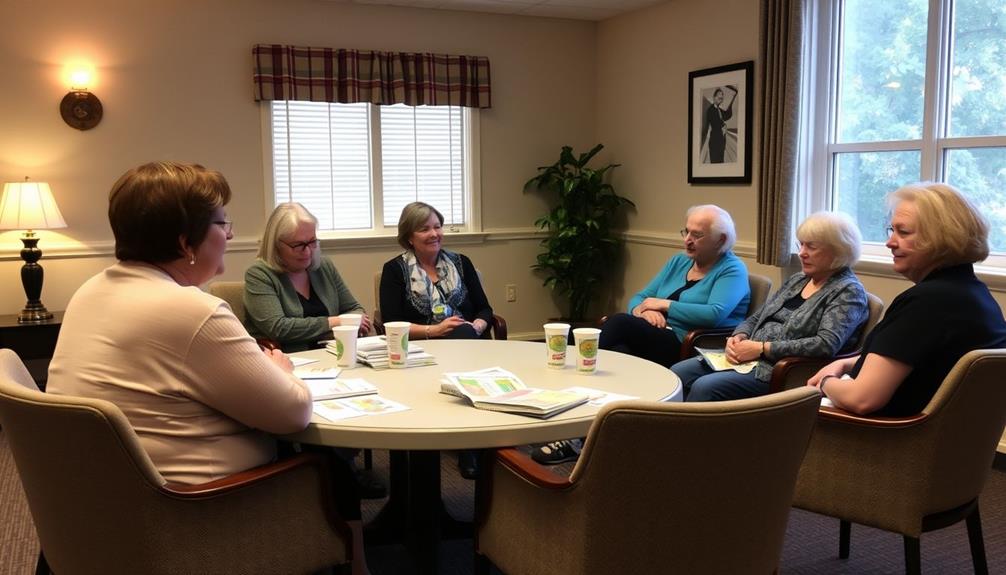Understanding Wolff-Parkinson-White syndrome (WPW) is crucial for caregivers. This condition involves an additional electrical pathway in the heart, resulting in symptoms like heart palpitations, dizziness, and fainting. It is important to be able to identify these signs so that timely interventions can be made. Diagnosis typically includes an ECG, and treatment options range from medications to catheter ablation. Supporting individuals with WPW also entails making healthy lifestyle changes, such as maintaining a balanced diet and utilizing stress management techniques. Keeping open communication with healthcare professionals and staying informed about WPW can empower your caregiving role. If you are interested in improving your caregiving support strategies, more valuable information awaits.
Key Takeaways
- WPW syndrome involves an extra electrical pathway in the heart, leading to symptoms like palpitations and dizziness.
- Diagnosis typically requires an ECG showing a short PR interval and delta wave patterns.
- Treatment options include catheter ablation, vagal maneuvers, and anti-arrhythmic medications.
- Lifestyle adjustments, such as a heart-healthy diet and stress management, can improve overall heart health.
- Caregivers should maintain open communication with healthcare providers and track symptoms for effective management.
Overview of WPW Syndrome

Understanding the complexities of Wolff-Parkinson-White (WPW) syndrome is fundamental for recognizing its impact on heart health. This congenital condition is characterized by an extra electrical pathway in the heart, which can lead to episodes of rapid heart rate, known as tachycardia. WPW syndrome affects approximately 1 to 3 per 1,000 individuals worldwide, impacting both children and adults.
Managing financial health is also essential for caregivers, as healthcare costs can arise unexpectedly; therefore, developing a personal budget is significant for planning.
Symptoms of WPW may include palpitations, dizziness, shortness of breath, and in severe cases, fainting or even cardiac arrest. To diagnose WPW, healthcare providers typically use an electrocardiogram (ECG), which reveals a short PR interval, a prolonged QRS complex, and a characteristic delta wave. These findings help confirm the presence of the extra electrical pathway.
When it comes to treatment options for WPW syndrome, they can vary based on the severity and frequency of your symptoms. Common approaches include catheter ablation, which targets the extra pathway, vagal maneuvers, and medications to manage episodes of tachycardia.
Understanding these aspects can empower you and your caregivers to make informed decisions regarding the management and treatment of WPW syndrome.
Causes and Risk Factors

Wolff-Parkinson-White (WPW) syndrome arises primarily from an extra electrical pathway in the heart, a condition that develops during cardiac embryogenesis. This congenital condition is often difficult to pinpoint because the exact causes remain largely unknown. However, some genetic mutations have been linked to WPW, suggesting a hereditary component in certain cases.
Individuals with this condition may experience intense episodes of anxiety due to the unpredictability of their symptoms. You should be aware that many individuals with WPW are asymptomatic, making it challenging to identify those affected. An estimated 65% of adolescents and 40% of individuals over 30 might've undiagnosed WPW.
Risk factors for sudden cardiac death among those with WPW include being male, under 35 years old, and having a history of atrial fibrillation or atrioventricular reentrant tachycardia (AVRT). Additionally, the presence of multiple accessory pathways increases these risks.
If WPW runs in your family, you might want to reflect on the incidence among first-degree relatives, which shows a prevalence of about 0.55%. Understanding these causes and risk factors is essential for early detection and effective management of WPW syndrome.
Recognizing Symptoms

Recognizing the symptoms of WPW syndrome is essential for timely intervention and management. If you or someone you care for experiences any of the following signs, it's important to seek help:
- Heart palpitations or a noticeable fluttering in the chest
- Dizziness or light-headedness
- Shortness of breath or chest tightness
These symptoms often arise during episodes of tachycardia, where the heart rate can exceed 200 beats per minute.
It's important to observe that similar symptoms can occur with stress or anxiety, making it crucial to differentiate between them for appropriate care. You might notice the symptoms of tachycardia lasting from just a few seconds to several hours, and they can occur both at rest and during physical activity.
Some individuals may also experience fainting spells due to sudden drops in blood pressure caused by these rapid heart rates. For further insight on managing health symptoms, consider exploring cold medications overview.
Be aware that while these symptoms can be alarming, recognizing them early can lead to proper management of WPW syndrome.
If you notice any of these signs, it's vital to consult a healthcare professional to discuss your experiences and determine the best course of action.
Prompt recognition and treatment can greatly reduce the risk of severe complications, including cardiac arrest.
Diagnostic Procedures

Several diagnostic procedures play an essential role in identifying Wolff-Parkinson-White (WPW) syndrome. The primary tool is the electrocardiogram (ECG), which typically shows a short PR interval and a prolonged QRS complex featuring a delta wave. This characteristic pattern is critical for diagnosis.
Additionally, managing overall health can support heart function, including practices like yoga for back pain that promote relaxation and stress reduction, which can indirectly benefit heart health.
To capture intermittent episodes of tachycardia, a Holter monitor might be used. This device continuously records your heart's electrical activity for 24 to 48 hours, providing valuable data on any arrhythmic events.
In a hospital setting, electrophysiological studies (EP studies) can confirm the presence of accessory pathways that may be causing the abnormal heart rhythms. These studies map your heart's electrical pathways, allowing doctors to determine the best course of action.
An echocardiogram may also be performed to assess your heart's structure and rule out any associated structural abnormalities that could contribute to arrhythmias.
Treatment Options

When it comes to treating Wolff-Parkinson-White syndrome, catheter ablation is often the go-to option, especially for those experiencing symptoms. This procedure has a high success rate of over 96% and carries a low complication risk of less than 0.5%.
For individuals undergoing stressful life events, such as a divorce, the emotional strain can exacerbate health conditions, making effective management even more essential. Additionally, understanding the financial implications of divorce can help in planning for medical expenses.
For some patients, additional treatment options may be necessary to manage symptoms effectively.
Here are a few options you might consider:
- Vagal maneuvers: Techniques like coughing or applying ice to the face can help slow a rapid heart rate during tachycardia episodes.
- Anti-arrhythmic medications: Drugs such as flecainide or propafenone may be prescribed for rate control and preventing tachycardia, but they're usually reserved for specific cases.
- Electrical cardioversion: This method can quickly restore normal heart rhythm for patients experiencing hemodynamic instability due to tachycardia.
Regular follow-up appointments are essential for monitoring asymptomatic patients. They guarantee timely interventions if symptoms or complications arise, allowing you to manage WPW syndrome effectively and maintain a good quality of life.
Lifestyle Adjustments

How can lifestyle adjustments make a difference in managing Wolff-Parkinson-White syndrome?
Making specific changes can greatly improve your heart health and help you manage WPW symptoms. Start by adopting a heart-healthy diet rich in fruits, vegetables, whole grains, and lean proteins.
Including antioxidant-rich foods, such as celery juice, can aid in maintaining ideal heart function and minimizing the risk of arrhythmias, as known for anti-inflammatory properties.
Regular exercise is also essential. Aim for moderate physical activity, but be sure to monitor your heart rate and avoid overexertion during episodes of fast heart rate. This way, you can stay active while keeping your heart safe.
Additionally, limit or avoid stimulants like caffeine and alcohol, as these can trigger symptoms and lead to rapid heart rates.
Don't overlook stress management, either. Incorporating mindfulness and relaxation techniques can enhance your overall well-being and help stabilize your heart rhythm in times of stress.
Coping Strategies

Coping with Wolff-Parkinson-White syndrome involves understanding your body and being prepared for potential episodes. Recognizing the signs—like rapid heartbeat or dizziness—enables you to react swiftly during a tachycardia episode.
Additionally, having a grasp of financial considerations for elderly care can be beneficial, especially as managing health conditions can often lead to increased medical expenses.
Here are some effective coping strategies:
- Learn vagal maneuvers: Techniques such as coughing or applying ice packs can help slow a fast heart rate.
- Keep a symptom log: Documenting the frequency and duration of episodes assists healthcare providers in tailoring treatment plans.
- Communicate openly: Sharing feelings and experiences related to WPW can help address the emotional aspects of living with this condition.
Establishing a routine of regular check-ups with your healthcare providers is essential for ongoing assessment and management. This proactive approach guarantees that you're always on top of your health needs.
Additionally, understanding your symptoms allows you to engage in meaningful conversations with your healthcare team, leading to better outcomes.
Resources and Support

When you're managing Wolff-Parkinson-White Syndrome, having access to quality educational materials can make a big difference in your understanding of the condition.
Utilizing strategies to tackle challenges, such as focusing on active listening and seeking common ground, can enhance your ability to communicate effectively with healthcare providers and support networks effective communication strategies.
Support groups and networks can also provide a sense of community, helping you connect with others who share similar experiences.
These resources are essential for both emotional and practical support as you manage WPW.
Educational Materials Availability
Educational materials on Wolff-Parkinson-White (WPW) Syndrome are readily accessible from a variety of reputable sources. These resources can help you understand WPW symptoms, diagnosis, and management better.
For caregivers looking to enhance their knowledge base, exploring further educational content on financial planning and investment strategies, such as Gold IRA Rollovers, can also be beneficial for long-term financial health.
It's vital for caregivers like you to stay informed about this condition. Here are some valuable resources you can explore:
- Mayo Clinic: Offers health newsletters and patient education materials focused on heart health.
- Cleveland Clinic Children's: Provides extensive information specifically tailored for caregivers of pediatric patients with WPW.
- Medical Publications: Share ongoing research findings that enhance the diagnosis and treatment of WPW and other arrhythmias.
Additionally, it's noteworthy that continuous education for healthcare professionals on conditions like WPW is essential for ensuring ideal patient care.
By utilizing these educational materials, you can empower yourself and others in your care network. Understanding WPW and its management won't only help you support your loved one but also encourage effective communication with healthcare professionals.
Stay engaged and informed to make the best decisions for health and well-being.
Support Groups and Networks
Many caregivers find immense value in connecting with support groups and networks dedicated to Wolff-Parkinson-White (WPW) syndrome. These groups offer a platform to share experiences, advice, and emotional support, fostering a strong sense of community. Various organizations, like the Arrhythmia Alliance and the American Heart Association, provide essential resources and educational materials that can empower you in your caregiving journey.
Here's a quick overview of some valuable resources:
| Type of Resource | Organization/Platform | Benefits |
|---|---|---|
| Support Groups | Arrhythmia Alliance | Emotional support and shared experiences |
| Educational Materials | American Heart Association | Up-to-date information on WPW treatments |
| Online Forums | Social Media Groups | Global insights and coping strategies |
Frequently Asked Questions
What Should You Avoid With Wpw?
You should avoid excessive caffeine, alcohol, and smoking. Be cautious with high-intensity exercise and manage stress effectively. These factors can trigger or worsen symptoms, so it's crucial to prioritize your heart health.
What Triggers Wolff-Parkinson-White Syndrome?
About 0.1% of the population has WPW syndrome. You might experience tachycardia episodes triggered by stress, caffeine, alcohol, or intense physical activity. Be mindful of these factors to manage your symptoms effectively.
What Is the Life Expectancy of a Person With Wolff-Parkinson-White?
You can expect a person with Wolff-Parkinson-White syndrome to have a normal life expectancy, especially if they're asymptomatic and receive appropriate treatment. Regular monitoring and care are essential for maintaining health and minimizing risks.
How Do I Stop a WPW Episode?
To stop a WPW episode, try vagal maneuvers like coughing or bearing down. If that doesn't work, seek medical help for options like medication or synchronized electrical cardioversion to restore your heart's rhythm.
Conclusion
In traversing the complexities of Wolff-Parkinson-White syndrome, you hold the key to a brighter future for your loved one. Imagine the stark contrast between uncertainty and understanding—where fear transforms into knowledge and support. By recognizing symptoms and embracing treatment options, you can turn intimidating moments into opportunities for healing. With lifestyle adjustments and coping strategies, you're not just managing a condition; you're fostering a life filled with hope. Together, you can make every heartbeat count. By staying informed and actively participating in their care, you’re not only addressing the physical aspects of the condition but also supporting their emotional well-being. It’s important to differentiate Wolff-Parkinson-White syndrome from other conditions, like identifying *hallucinations in Parkinson’s disease*, so that appropriate interventions can be made. With love, knowledge, and perseverance, you can help build a future that prioritizes both heart and mind health. By fostering open communication with healthcare professionals and staying vigilant about changes in symptoms, you are actively contributing to a holistic approach to the well-being of your loved one. While it’s crucial to focus on Wolff-Parkinson-White syndrome, also being aware of related issues, such as *hallucinations in Parkinson’s disease*, can help you prepare for potential challenges and ensure the right care path is followed. Empowered by knowledge and a compassionate heart, you can make a significant difference in their journey toward a healthier, more fulfilling life.









